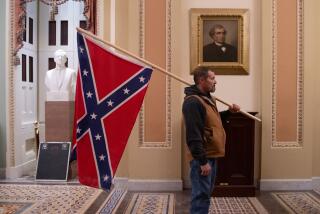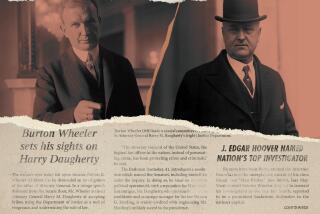And now, the G.W. legacy
The Bush Tragedy
Jacob Weisberg
Random House: 276 pp., $26
*
In the years that follow the second Bush presidency, many of us will no doubt continue to ask ourselves how we squandered so much of the power, prestige and wealth that were left to us by earlier generations, and why we entrusted the fate of the nation to a man so plainly unfit for that responsibility.
For, as Jacob Weisberg remarks in the introduction to “The Bush Tragedy,” the price of those errors is coming due as we are forced to acknowledge that our country has been “diminished in relation to the rest of the world” and that we may be destined for “a long-term decline in American status.” So great are the consequences of the rise of George W. Bush that we are likely to find ourselves sifting through the story again and again, with an almost neurotic compulsion, trying to find exactly where we went wrong.
Although the jacket copy proclaims that this book “cracks the code of the Bush presidency,” such hyperbole hardly seems fair to all the volumes that came before, chiefly because Weisberg considers the same personalities and events as previous authors in ways that are by now commonplace. His approach emphasizes the lifelong conflict between the president and his father, which does not qualify as an original insight at this point, although the author deploys the usual analogies to Shakespeare’s Henry IV and Prince Hal with erudition and eloquence.
In essence, Weisberg argues that George W.’s life and presidency have been shaped and misshaped by his overpowering impulses to emulate and later reject George Herbert Walker Bush, his hero turned nemesis. Where the father tended to be modest and moderate, the son insisted on being boastful and extreme. Where the father remained skeptical of overarching visions and ideological ambitions, the son came to believe in a great and divinely ordained national destiny. And where the father was deliberative and thoughtful, the son became impetuous and reckless.
Perhaps unavoidably, as Weisberg rakes through the past, he recapitulates anecdotes and quotes that will be familiar to many. Yet again, but probably not for the last time, we relive that holiday showdown at the family home, back when a 26-year-old drunken Georgie runs over the garbage cans with his car and finds himself on the doorstep, challenging Dad to go “mano a mano” as father gazes disdainfully over his spectacles. Amusing as that story may have sounded the first few times, it doesn’t really tell us much about the president almost four decades later.
--
The born-again Bush
In a later chapter scrutinizing the president’s religiosity -- and the political uses to which he has put his piety -- Weisberg informs us that the accepted version of Bush’s midlife evangelical rebirth, midwifed by the Rev. Billy Graham, is false. The man who brought him to salvation was instead a more obscure and eccentric character named Arthur Blessitt. But the Graham fiction and the Blessitt tale were both told by, among others, Craig Unger in “The Fall of the House of Bush,” which arrived in bookstores a couple of months ago.
More compelling, from historical and psychological standpoints, is Weisberg’s investigation of the fraught relationships among the men of the Bush and Walker families, whose own contrasting characters set the stage for the devolution of the dynasty. The president’s forbidding but upright grandfather, Prescott Bush, who served as a liberal Republican senator from Connecticut, evidently could not abide the Walkers, a flashy, arrogant and dissolute clan from the Midwest who pursued wealth and pleasure without the slightest interest in public service. It is the Walker character -- aggressive, impatient, competitive, charismatic and sometimes mean, according to Weisberg -- that found expression in George W.
In these Oedipal clashes and inherited flaws, Weisberg finds the roots of the president’s attraction to figures such as Vice President Dick Cheney and recently exited political boss Karl Rove, who have played such fateful and ultimately destructive roles in his White House, conniving to manipulate a man who could not match them in intellect or industriousness. By sketching in their backgrounds, he demonstrates how Cheney developed the overweening theory of absolute executive authority that led to Guantanamo and worse, and why Rove elevated a plan for permanent partisan domination above the interests of the administration and the nation. The irretrievable turning point came when Bush allowed Rove and Cheney to fashion a “war presidency” that sought unchallenged power and rejected bipartisan cooperation.
Here again the author is telling stories that many readers will have heard before, but he analyzes the central disaster of the Bush administration with skill and seriousness. He does so, moreover, from the perspective of a “liberal hawk” who, as editor in chief of Slate magazine, endorsed the invasion of Iraq, which he now compares with Vietnam as a policy catastrophe.
-
Giving him his due
Although Weisberg does not hesitate to criticize the president and his associates, he also takes pains to give them their due. He portrays Bush as a sincere advocate of reform in race relations, education and immigration, and as a Christian whose personal conduct was improved by religious conversion. He intends to make no radical critique of the Bush dynasty and the Republican right, and in his wish to seem objective, he sometimes ignores or dismisses the most damning episodes. While glossing over the case of CIA agent Valerie Plame Wilson, for example, he seems to exonerate the president of any complicity for “outing” her, despite clear evidence otherwise. Weisberg claims that Bush only “came to realize that Rove had misled him about [Rove’s] involvement” in the leak of Plame’s identity. More broadly, he takes little interest in the corporate and political structures that have employed the Bushes to achieve their own ends.
But it is precisely because Weisberg struggles for objectivity and fairness that his deeply negative conclusions are so damning. We will look at George W. Bush again and again, and the portrait will only get darker.
--
Joe Conason, a columnist for the New York Observer and Salon.com, is the author, most recently, of “It Can Happen Here: Authoritarian Peril in the Age of Bush.”
More to Read
Sign up for our Book Club newsletter
Get the latest news, events and more from the Los Angeles Times Book Club, and help us get L.A. reading and talking.
You may occasionally receive promotional content from the Los Angeles Times.







